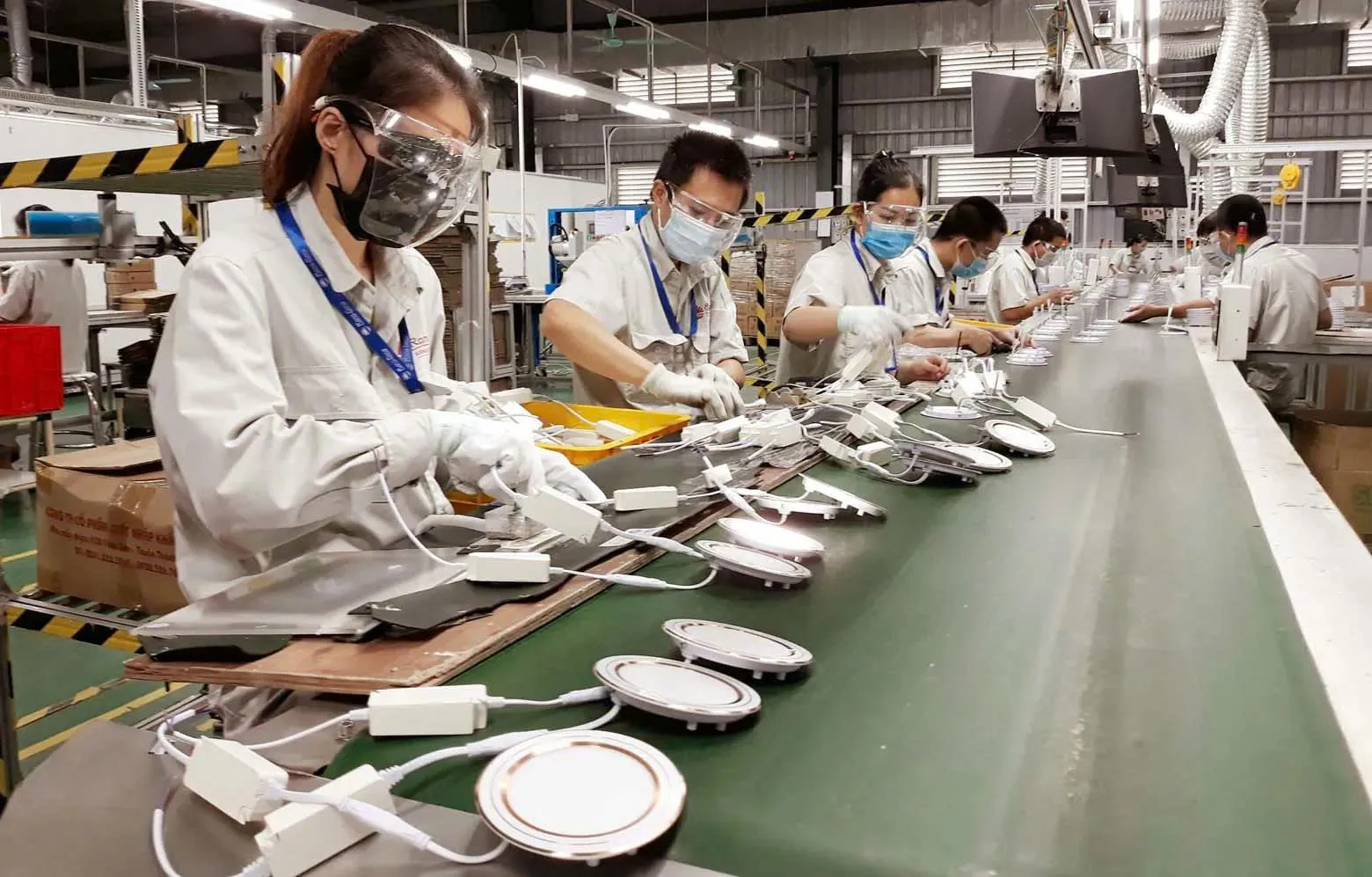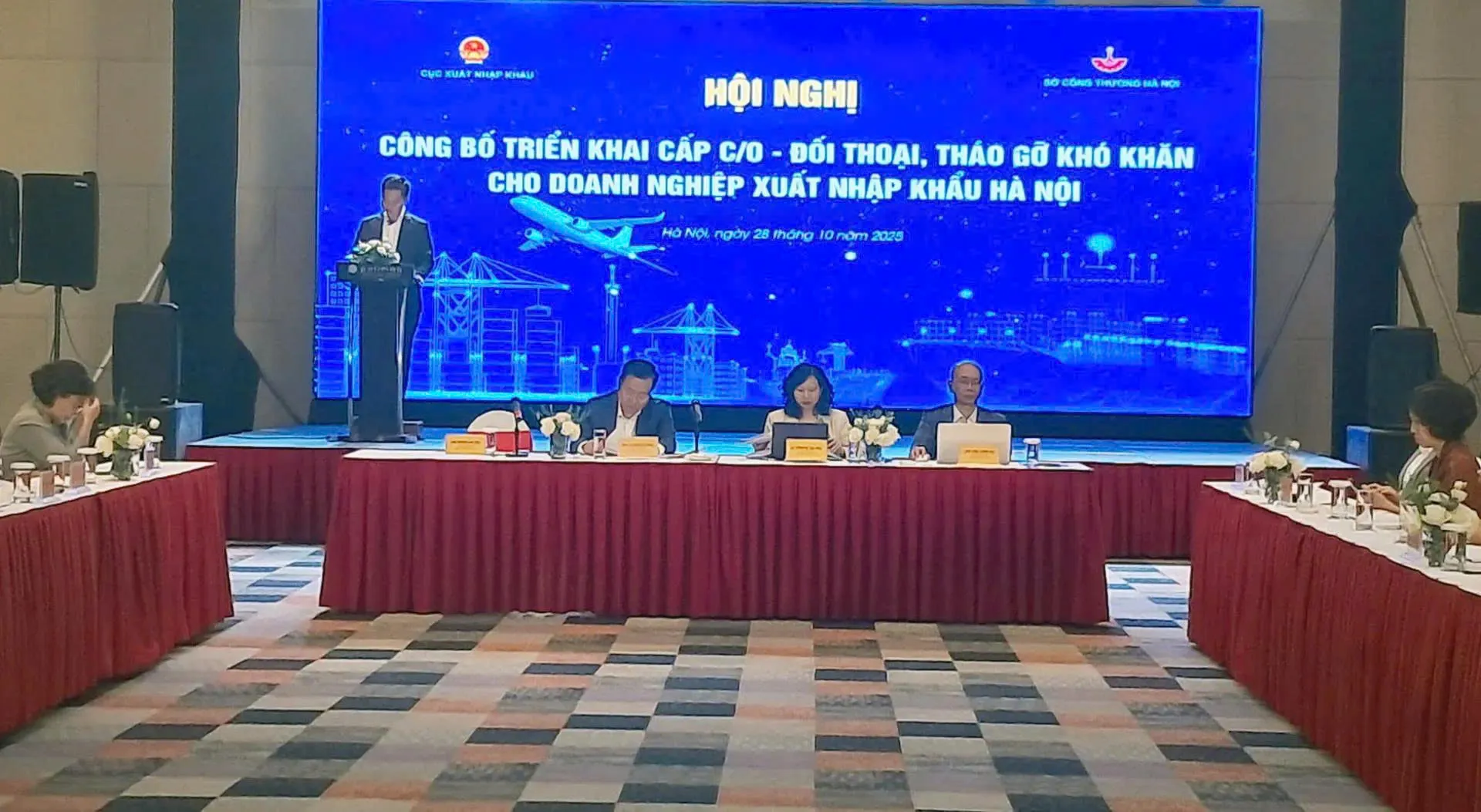Certificate of origin initiative positions Hanoi as leader in export facilitation
Hanoi authorities committ to side with local enterprises to seek advantages in Vietnam's free trade agreements (FTAs) through faster digitalization, simplified export procedures and improved facilitation, thus enhancing their competitiveness and expand access to global markets.
Hanoi is among the leading localities in Vietnam in issuing Certificates of Origin (C/O), reflecting its proactive support for businesses, according to the Agency of Foreign Trade under the Ministry of Industry and Trade.
The issuance of C/O is one of 59 administrative procedures in import and export management that the ministry has decentralized to 34 provinces and centrally-governed cities following the two-tier local administration model that began operation on July 1, 2025.

Export production at Rang Dong Light Source and Vacuum Flask Joint Stock Company. Photo: Hoai Nam/The Hanoi Times.
The agency’s Director Nguyen Anh Son said that delegating administrative procedures, especially in export activities, reduces costs and time for businesses and increase local authorities’ initiative and accountability in state management.
“This is a major shift that makes it easier for businesses to complete applications directly at the local level,” he told a seminar on October 28.
Trinh Thi Thu Hien, Deputy Director of the agency, said that having a C/O helps Vietnamese exporters to enjoy tariff incentives under free trade agreements (FTAs).
For examples, export tariff on Hanoi’s knit sock exports has fallen to 0% from 12% in the European Union markets and from 18% in Canada, she said.
“These preferential rates increase profits and enhance the competitiveness of exporters,” Hien said.
Vietnamese exporters can either apply for C/O issuance from authorized agencies or self-certify the origin of goods, taking full legal responsibility for the accuracy of the documents. For shipments valued under 6,000 euros under the EVFTA or UKVFTA, businesses may self-certify without formal approval.
Under the decentralized administrative system, businesses can submit applications in any province or city they find convenient, not necessarily where their factories are located.
“Hanoi receives C/O applications from both local companies and those in nearby provinces, even from the South, reducing administrative barriers and improving convenience for businesses,” said Hien.
According to the Hanoi Department of Industry and Trade, the agency is currently issuing C/O certificates and authorizing companies to self-certify product origin. All C/O forms and authorization letters will be fully implemented by the end of 2025, helping enterprises quickly access tariff benefits, boost exports and strengthen competitiveness in FTA markets.
In September 2025, the Hanoi People’s Committee authorized the Department of Industry and Trade to handle 37 administrative procedures, including 36 related to C/O issuance and one for export certification of textiles to Mexico.
The Agency of Foreign Trade, the Hanoi Department of Industry and Trade and the Department of E-Commerce and Digital Economy are working to link the eCoSys electronic C/O management system, allowing businesses to register, track and store C/O data online, reducing time and costs.
“Hanoi’s Department of Industry and Trade is one of the pioneers, completing its process and ensuring smooth connection with the national electronic C/O system,” Hien said.
“This shows the city’s proactive spirit in working with businesses and promoting economic growth through export facilitation,” she added.
Vo Nguyen Phong, Director of the Hanoi Department of Industry and Trade, emphasized that exports remain a key driver of the capital’s economy.
In 2024, Hanoi recorded more than US$19 billion in exports and US$41.4 billion in imports. During January and September of 2025, export turnover rose 12% on-year to US$15.7 billion.
Hanoi’s goods now reach 205 countries and territories, with key exports including agricultural products, textiles, electronics, machinery, glassware, ceramics, wood and components.
“These results reflect the combined efforts of the government, the Ministry of Industry and Trade, the city administration and the business community,” said Phong.

Overview of the conference announcing the implementation of Certificates of Origin (C/O) issuance for enterprises. Photo: Hoai Nam/The Hanoi Times.
He described the two-tier administration model and strong decentralization in import and export management as a breakthrough that enhances Hanoi’s administrative capacity and business support.
The department will continue to promote digital transformation, simplify C/O procedures and help enterprises make better use of FTAs to expand export markets, Phong said.
Advices from business community
At the conference, government agencies and export companies proposed several initiatives to strengthen export performance and maximize FTA benefits.
Mac Quoc Anh, Vice Chairman and General Secretary of the Hanoi Association of Small and Medium Enterprises (HANOISME), suggested establishing a Hanoi FTA Center to connect government bodies, customs and businesses for consultation and information sharing.
The center would help companies access timely information and raise the FTA tax incentive utilization rate from the current 32% to about 55% by 2026, he said.
He also proposed digitizing the entire C/O issuance process to cut processing time by half, ensure 100% of applications are handled online by 2026 and eliminate paperwork entirely.
Anh recommended creating an FTA capability index to assess businesses’ ability to use tariff incentives, manage documentation, improve logistics and adopt green transformation.
This index would classify enterprises by sector such as food, light manufacturing, engineering and high technology, the HANOISME vice chairman said.
According to Nguyen Cong Cuong, Vice Chairman of the Hanoi Key Industrial Enterprises Association, many firms in electronics, precision mechanics, new materials and high-tech manufacturing have joined global supply chains but now face trade defense risks from major markets like the United States, the EU, Japan and South Korea.
Referring to unexpected investigations that have caused those companies severe damages and losses, he urged building an industry-based early warning system to help businesses respond proactively to anti-dumping or safeguard measures.
Cuong also called for stronger legal support for small and medium enterprises to understand international trade regulations and protect themselves in disputes.
He emphasized that administrative reform and data integration are crucial to competitiveness.
“The city should treat business satisfaction as a key indicator of administrative reform and expand online support, especially during peak hours,” he added.
Ngo Chung Khanh, Deputy General Director of the Multilateral Trade Policy Department, said that FTAs like EVFTA and CPTPP have reduced import tariffs from 12%–18% to 0%, creating major export opportunities for Vietnamese goods.
However, Vietnamese exports have yet to gain proportional market share in new FTA markets such as the EU, Canada and Mexico.
He advised Hanoi to develop FTA-skilled human resources and promote green exports so that enterprises can fully benefit from tariff reductions and meet global standards.








